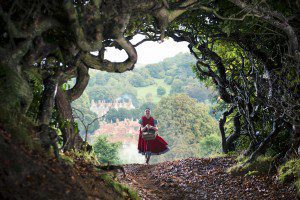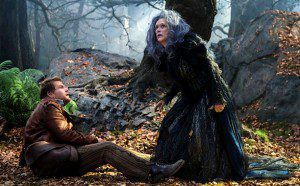In her look back on the year in pop culture, Christianity Today’s Alissa Wilkinson deftly discusses the many, many ways in which 2014’s movies and television shows have grappled with the concept of evil. And while our entertainment offers lots of different sources for evil, Wilkinson says, one of the biggest is disturbingly close to home: We make our own problems. She writes:
We moderns feel comforted by the idea that evil is something we create or choose through our own actions—and therefore it’s something we can choose not to embrace, something we can control or destroy on our own. Certainly, Christian theology has this idea embedded in it; in a Christian anthropology of man, we are given the freedom to choose life or death, to do good or evil.
‘Course, that evil we choose doesn’t always look all that evil at first—or if it does, it seems like the proverbial lesser of two. Sure, maybe we lie or cheat a little, but we had to, see? We didn’t have a choice. We needed something, and it was the only way we could get it.
But sometimes, even the ever-so-slightly wicked choices we make can grow … like a beanstalk.
 In Into the Woods, we meet a handful of people who could really use a little help. Cinderella (Anna Kendrick) would very much like to go to the king’s party. Young Jack (Daniel Huttlestone) wants his beloved cow, Milky White, to crank out some milk. The Baker (James Corden) and his Wife (Emily Blunt) are pining for a baby.
In Into the Woods, we meet a handful of people who could really use a little help. Cinderella (Anna Kendrick) would very much like to go to the king’s party. Young Jack (Daniel Huttlestone) wants his beloved cow, Milky White, to crank out some milk. The Baker (James Corden) and his Wife (Emily Blunt) are pining for a baby.
In the real world, we’re sometimes expected to simply alter our expectations in the face of certain obstacles. There’ll be other parties! we might say. We can adopt! I feel like steak tonight, anyway! But fortunately (?) these folks live in an enchanted realm filled with all sorts of magical remedies. And before the curtain comes down on Act I, they all seem to get their “happily ever after” ending—even if they had to lie or steal a little to do it: Cinderella not only went to the ball, but got her prince. The Baker and his Wife have their baby. And Jack—well, his cow might not be all that, but he did snag a lot of gold from a giant-infested land in the clouds. Yay! Everyone’s happy.
Well, for a minute … until a really ticked-off giantess descends from the clouds.
It’s an evil that seems to come, almost literally, out of nowhere. Sometimes the evils in our world can seem a little like that, too. We can all be attacked by stuff that doesn’t seem like it’s at all our fault.
But is that always true? It’s not here. The giantess wouldn’t be on the rampage if Jack hadn’t killed her husband. And Jack wouldn’t have killed her husband if Jack hadn’t stolen a magic harp, which sent the giant chasing after the lad. There’s a reason for this evil after all.
 Then again, is Jack really to blame? In the song “Your Fault,” we’re reminded that Jack never would’ve have climbed up to the giant’s land in the first place had not the Baker and his Wife swindled him out of Milky White for some magic beans. But the Baker never would’ve swindled ordinarily, but an ugly old witch (Meryl Streep) made them: She promised to lift their childless curse in exchange for some spell ingredients. But the witch protests it’s not her fault. She wouldn’t have needed to cast the spell if … well, you get the idea. The buck is passed with alacrity.
Then again, is Jack really to blame? In the song “Your Fault,” we’re reminded that Jack never would’ve have climbed up to the giant’s land in the first place had not the Baker and his Wife swindled him out of Milky White for some magic beans. But the Baker never would’ve swindled ordinarily, but an ugly old witch (Meryl Streep) made them: She promised to lift their childless curse in exchange for some spell ingredients. But the witch protests it’s not her fault. She wouldn’t have needed to cast the spell if … well, you get the idea. The buck is passed with alacrity.
You’re responsible!” They scream/sing at each other. “You’re the one to blame! It’s your fault!”
And on it goes. Cinderella indirectly caused a new beanstalk to grow. Little Red Riding Hood goaded Jack into stealing a magic harp from the giants. Everyone, it seems, is guilty. Their sins—small and easily rationalized as they might’ve been—wound up sprouting into something really big and dangerous. A gigantic problem, as it were.
I believe that God sometimes enjoys working slowly, like a farmer—planting seeds that, eventually, help lead us to Him. Sure, people may sometimes have the proverbial come-to-Jesus thunderclap, wherein the beauty and power of God rushes upon them all at once. But more often, I think we find our way to God gradually, through lots of seemingly insignificant moments. A book here. A timely conversation there. A strange, unbidden tickle in the soul. I talk a lot about such moments in this space, ’cause I believe that God works through pop culture, too. Seeds are sown in the unlikeliest of places sometimes.
But I think evil can work the same way in our lives. We say a little lie. We make a slightly unethical choice. We plant these little seeds over months or years, not thinking much about any of them or even knowing that we’re planting them at all. we cast those choices aside like … well, like magic beans. And then one day we look into our back yard and find a beanstalk—and destruction is scaling down its leafy vines. And sometimes we, like our Into the Woods characters, try to lay blame on everyone and everywhere but themselves.
Not everyone gets a happily ever after ending in Into the Woods. Sure, penance is done and wrongs are righted, but sin, very often, has uncomfortable consequences—even to folks who hadn’t sinned at all.
But perhaps those that made it to the credits learned a valuable lesson: Watch what you sow. You never know what it might grow into.













